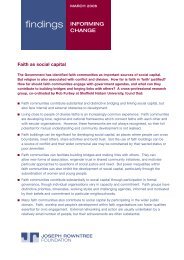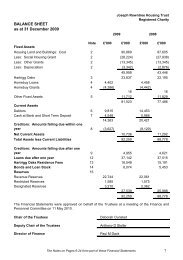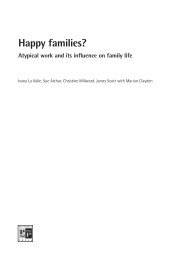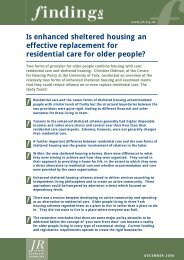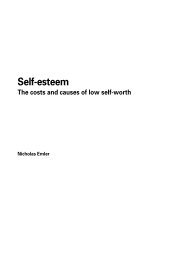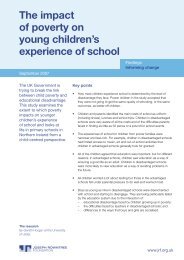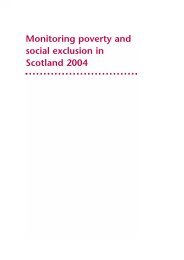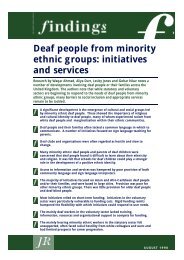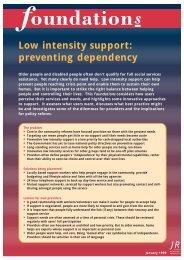Community participation - Joseph Rowntree Foundation
Community participation - Joseph Rowntree Foundation
Community participation - Joseph Rowntree Foundation
You also want an ePaper? Increase the reach of your titles
YUMPU automatically turns print PDFs into web optimized ePapers that Google loves.
Notes<br />
Chapter 4<br />
1 J. Guare, Six Degrees of Separation (London: Methuen Drama, 1992).<br />
2 For example, ‘The initial challenge here is to reach beyond what are sometimes<br />
called the “usual suspects”. The “usual suspects” are the residents who are most<br />
inclined (and able) to get involved and have their say. There is a strong case for<br />
considering consultation mechanisms that will give those who are not regularly<br />
involved a chance to consider the budget options faced by the council’. Office of<br />
the Deputy Prime Minister, Council Tax Consultation – Guidelines for Local<br />
Authorities (London: ODPM, 2002).<br />
3 C. Hay, ‘Structure and agency’, in D. Marsh and G. Stoker (eds), Theory and<br />
Methods in Political Science (Basingstoke: Macmillan, 1995).<br />
4 See, inter alia, D. Watts, Six Degrees: The Science of a Connected Age (London:<br />
William Heineman, 2003) and M. Buchanan, Small World: Uncovering Nature’s<br />
Hidden Networks (London: Weidenfeld & Nicolson, 2002).<br />
5 A. Laslo Barabasi, Linked: How Everything is Connected to Everything Else and<br />
What it Means for Business, Science, and Everyday Life (New York: Plume,<br />
2003); M. Buchanan, Small World: Uncovering Nature’s Hidden Networks<br />
(London: Weidenfeld & Nicolson, 2002).<br />
6 J.-P. Bouchaud and M. Mézard, ‘Wealth condensation in a simple model of<br />
economy’, Physica A, Vol. 282, pp. 536–40 (2000).<br />
7 See M. Buchanan, ‘The science of inequality’, in H. McCarthy, P. Miller and P.<br />
Skidmore (eds) Network Logic: Who Governs in an Interconnected World?<br />
(London: Demos, 2004).<br />
8 Even when the scientists ran the model starting from a perfectly egalitarian model<br />
with all agents on exactly equal terms, the same highly unequal distribution<br />
eventually occurred.<br />
9 M. Foley and R. Edwards, ‘Is it time to disinvest in social capital?’, Journal of<br />
Public Policy, Vol. 19, No. 2, pp. 199–231 (1999).<br />
10 J. Birchall and R. Simmons, ‘A theoretical model of what motivates public service<br />
users to participate’, ESRC Democracy and Participation (2002), cited in J.<br />
Aspden and D. Birch, New Localism – Citizen Engagement, Neighbourhoods and<br />
Public Services: Evidence from Local Government (London: ODPM, 2005).<br />
73



